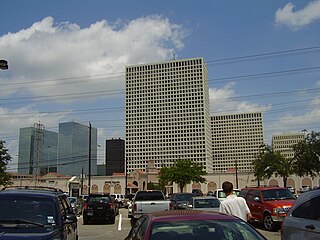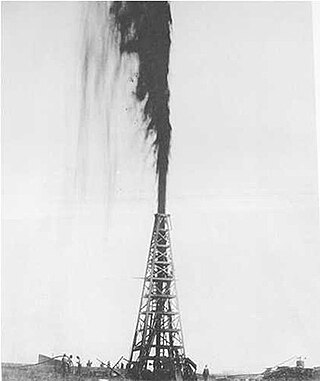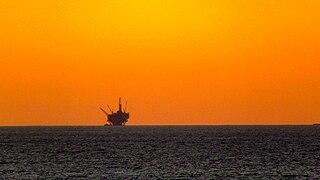Related Research Articles

The North Sea lies between Great Britain, Denmark, Norway, Germany, the Netherlands, Belgium and France. An epeiric sea on the European continental shelf, it connects to the Atlantic Ocean through the English Channel in the south and the Norwegian Sea in the north. It is more than 970 kilometres (600 mi) long and 580 kilometres (360 mi) wide, covering 570,000 square kilometres (220,000 sq mi).

An oil platform is a large structure with facilities to extract and process petroleum and natural gas that lie in rock formations beneath the seabed. Many oil platforms will also have facilities to accommodate the workers, although it is also common to have a separate accommodation platform linked by bridge to the production platform. Most commonly, oil platforms engage in activities on the continental shelf, though they can also be used in lakes, inshore waters, and inland seas. Depending on the circumstances, the platform may be fixed to the ocean floor, consist of an artificial island, or float. In some arrangements the main facility may have storage facilities for the processed oil. Remote subsea wells may also be connected to a platform by flow lines and by umbilical connections. These sub-sea facilities may include one or more subsea wells or manifold centres for multiple wells.

Robert Crow was an English trade union leader who served as the General Secretary of the National Union of Rail, Maritime and Transport Workers (RMT) from 2002 until his death in 2014. He was also a member of the General Council of the Trades Union Congress (TUC). A self-described "communist/socialist", he was a leading figure in the No to EU – Yes to Democracy campaign.

The National Union of Rail, Maritime and Transport Workers is a British trade union covering the transport sector. Its current President is Alex Gordon and its current General Secretary is Mick Lynch.

Piper Alpha was an oil platform located in the North Sea about 120 miles (190 km) north-east of Aberdeen, Scotland. It was operated by Occidental Petroleum (Caledonia) Limited (OPCAL) and began production in December 1976, initially as an oil-only platform, but later converted to add gas production.

North Sea oil is a mixture of hydrocarbons, comprising liquid petroleum and natural gas, produced from petroleum reservoirs beneath the North Sea.

Paul Neal "Red" Adair was an American oil well firefighter. He became notable internationally as an innovator in the specialized and hazardous profession of extinguishing and capping oil well blowouts, both land-based and offshore.

Transocean Ltd. is an American drilling company. It is the world's largest offshore drilling contractor based on revenue and is based in Vernier, Switzerland. The company has offices in 20 countries, including Canada, the United States, Norway, United Kingdom, India, Brazil, Singapore, Indonesia, and Malaysia.

Byford Dolphin was a semi-submersible, column-stabilised drilling rig operated by Dolphin Drilling, a Fred Olsen Energy subsidiary. It drilled seasonally for various companies in the British, Danish, and Norwegian sectors of the North Sea. It was registered in Hamilton, Bermuda. In 2019, Dolphin scrapped the rig.
The State Oil Company of the Republic of Azerbaijan, largely known by its abbreviation SOCAR, is a fully state-owned national oil and gas company headquartered in Baku, Azerbaijan. The company produces oil and natural gas from onshore and offshore fields in the Azerbaijani segment of the Caspian Sea. It operates the country's only oil refinery, one gas processing plant and runs several oil and gas export pipelines throughout the country. It owns fuel filling station networks under the SOCAR brand in Azerbaijan, Turkey, Georgia, Ukraine, Romania, Switzerland, and Austria.

A blowout is the uncontrolled release of crude oil and/or natural gas from an oil well or gas well after pressure control systems have failed. Modern wells have blowout preventers intended to prevent such an occurrence. An accidental spark during a blowout can lead to a catastrophic oil or gas fire.
Piper Bravo is a North Sea oil production platform originally operated by Occidental Petroleum (Caledonia) Ltd, and now owned by Repsol Sinopec Energy UK.
The petroleum industry in Aberdeen, the third most populous city in Scotland, began in the mid-20th century following the discovery of significant oil deposits in the North Sea. Aberdeen has been characterised as the "oil capital" of Scotland, the United Kingdom, as well as Europe as a whole.

Offshore drilling is a mechanical process where a wellbore is drilled below the seabed. It is typically carried out in order to explore for and subsequently extract petroleum that lies in rock formations beneath the seabed. Most commonly, the term is used to describe drilling activities on the continental shelf, though the term can also be applied to drilling in lakes, inshore waters and inland seas.
Bristow Helicopters Limited is a British civil helicopter operator originally based at Aberdeen Airport, Scotland, which is currently a part of the U.S.-based Bristow Group which in turn has its corporate headquarters in Houston, Texas, U.S. In 2020, Bristow Group was merged with Era Helicopters, a large U.S.-based commercial helicopter operator that was previously a division of Era Aviation, with the two companies then continuing to use the Bristow name.

Rescue is a 13-part documentary series created, directed and filmed by Paul Berriff. It focused on the air-sea rescue work of "Rescue 137", a Sea King belonging to 202 Sqn, Royal Air Force Search and Rescue Force in and around their base at RAF Lossiemouth, Scotland and the North Sea over a period of a year between 1988 -1989.

Deepwater Horizon was an ultra-deepwater, dynamically positioned, semi-submersible offshore drilling rig owned by Transocean and operated by BP. On 20 April 2010, while drilling at the Macondo Prospect, a blowout caused an explosion on the rig that killed 11 crewmen and ignited a fireball visible from 40 miles (64 km) away. The fire was inextinguishable and, two days later, on 22 April, the Horizon sank, leaving the well gushing at the seabed and creating the largest marine oil spill in history.

The oil and gas industry plays a central role in the economy of the United Kingdom. Oil and gas account for more than three-quarters of the UK's total primary energy needs. Oil provides 97 per cent of the fuel for transport, and gas is a key fuel for heating and electricity generation. Transport, heating and electricity each account for about one-third of the UK's primary energy needs. Oil and gas are also major feedstocks for the petrochemicals industries producing pharmaceuticals, plastics, cosmetics and domestic appliances.
Events from the year 1988 in Scotland.
The 2022–2024 United Kingdom railway strikes are an industrial dispute in the United Kingdom (UK). The UK has seen its largest incidence of industrial action since 1989, beginning in the second Johnson ministry and continuing through the Truss ministry and Sunak ministry. The railway strikes commenced on 21 June 2022 after members of the National Union of Rail, Maritime and Transport Workers (RMT) walked out over wages, planned changes to working practices – involving the removal of guards from trains, the reduction in the number of open ticket offices, and an increase in the age at which people could claim the young persons and senior citizen card – and the threat of redundancies. The disputes in Scotland and Wales were resolved by the RMT in December 2022, and by ASLEF in May 2023. In much of England the RMT dispute was resolved in November 2023. As of January 2024, the RMT dispute remains active in London, while the ASLEF dispute is active across all of England.
References
- 1 2 Thomas, Allister (16 October 2019). "Marking 30 Years of the RMT 'Oilc' Offshore Union Branch". Energy Voice. Archived from the original on 26 March 2023. Retrieved 5 January 2024.
- 1 2 "RMT Membership Passes 80,000 as OILC Merger Is Completed". RMT . 23 April 2008. Archived from the original on 30 August 2010.
- ↑ Ali, Umar. "Through Time: Offshore Strikes in the North Sea". Offshore Technology Focus. Retrieved 17 December 2023.
- ↑ Woolfson, Charles; Beck, Matthias (2000). "The British Offshore Oil Industry After Piper Alpha". New Solutions . 10 (1–2): 11–65. doi: 10.2190/TCMB-YQA4-TXU0-B1D4 .